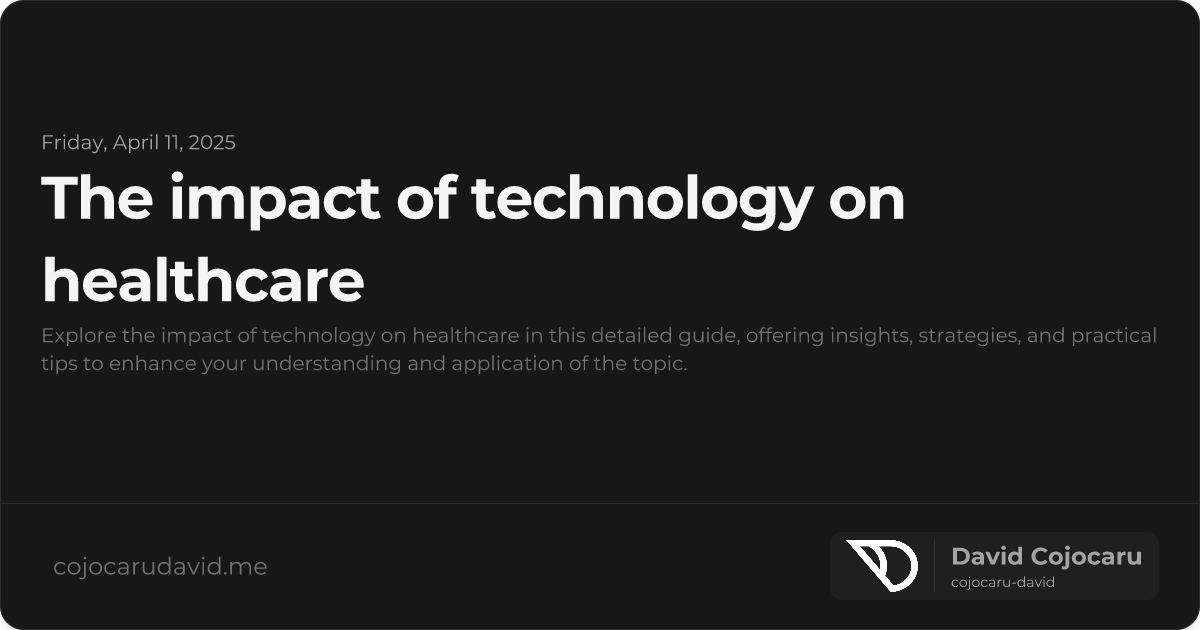Revolutionizing Healthcare: The Transformative Impact of Technology
Technology’s impact on healthcare is nothing short of revolutionary. From AI-powered diagnostics that detect diseases earlier to telemedicine platforms connecting patients with specialists across vast distances, technology is reshaping how we experience healthcare. This post dives into the key innovations driving this transformation, exploring their benefits and addressing the challenges that come with integrating these powerful tools.
How Technology is Transforming Healthcare: A New Era of Patient Care
Modern healthcare relies heavily on cutting-edge technology to improve patient outcomes and streamline operations. Let’s explore some of the most impactful advancements:
1. Electronic Health Records (EHRs): Streamlining Information, Enhancing Collaboration
Electronic Health Records (EHRs) have replaced cumbersome paper-based systems, creating a digital ecosystem for patient information. This shift enables seamless data sharing and improved communication among healthcare providers. The benefits are significant:
- Reduced Medical Errors: Eliminating manual record-keeping reduces the risk of human error and ensures accuracy.
- Faster Access to Patient History: Instant access to a patient’s medical history allows for more informed and timely decision-making.
- Improved Care Coordination: EHRs facilitate better communication and collaboration between specialists, leading to more comprehensive and coordinated care.
2. Telemedicine and Remote Care: Expanding Access, Bridging Gaps
Telemedicine is breaking down geographical barriers and expanding access to healthcare, particularly in rural and underserved communities. Virtual consultations offer numerous advantages:
- Convenient Follow-up Appointments: Patients can attend follow-up appointments from the comfort of their homes, saving time and travel costs.
- Reduced Hospital Overcrowding: Telemedicine helps alleviate pressure on hospitals by providing remote care options for non-emergency situations.
- Real-time Monitoring of Chronic Conditions: Remote monitoring devices allow healthcare providers to track vital signs and manage chronic conditions more effectively.
3. Artificial Intelligence (AI) in Diagnostics: Precision and Prediction
Artificial Intelligence (AI) is revolutionizing diagnostics by analyzing medical images and patient data with remarkable speed and accuracy. Its applications are diverse and transformative:
- Early Disease Detection: AI algorithms can detect subtle patterns in medical images, enabling earlier diagnosis of diseases like cancer.
- Personalized Treatment Plans: AI-powered predictive analytics can analyze patient data to develop personalized treatment plans that are tailored to individual needs.
- Automation of Administrative Tasks: AI can automate repetitive administrative tasks, freeing up healthcare professionals to focus on patient care.
The Future of Healthcare: Emerging Technologies to Watch
The innovations don’t stop there. Several emerging technologies are poised to further revolutionize healthcare:
Wearable Health Devices: Empowering Patients, Promoting Wellness
Smartwatches, fitness trackers, and other wearable devices are providing patients with real-time insights into their health. By monitoring vital signs like heart rate, blood pressure, and sleep patterns, these devices empower individuals to take proactive steps toward better health.
Robotic Surgery: Precision, Minimally Invasive Procedures, Faster Recovery
Robotic-assisted surgery offers surgeons enhanced precision, dexterity, and control during complex procedures. The benefits include smaller incisions, reduced pain, and faster recovery times for patients.
Blockchain for Secure Medical Data: Protecting Patient Privacy, Enhancing Data Security
Blockchain technology provides a secure and transparent platform for managing medical data. By ensuring tamper-proof records, blockchain enhances data security and protects patient privacy.
Navigating the Challenges: Considerations for a Tech-Driven Future
While technology offers immense potential, we must also address the challenges associated with its implementation:
- High Implementation Costs: The initial investment in new technologies can be significant for hospitals and healthcare providers.
- Cybersecurity Risks: Protecting digital health records from cyber threats is crucial to maintaining patient privacy and data security.
- Training and Adoption: Healthcare staff require adequate training to effectively use new technologies and integrate them into their workflows.
Conclusion: A Future of Patient-Centric, Technology-Enabled Healthcare
The impact of technology on healthcare is undeniable. It’s driving efficiency, improving accuracy, and empowering patients to take control of their health. As innovations continue to evolve, the future of medicine looks increasingly digital, personalized, and patient-centric. The key is to embrace these advancements responsibly, ensuring that technology serves as a tool to enhance, not replace, the human connection at the heart of healthcare.
“Technology will never replace great doctors, but doctors who use technology will replace those who don’t.” — Dr. Robert Pearl

